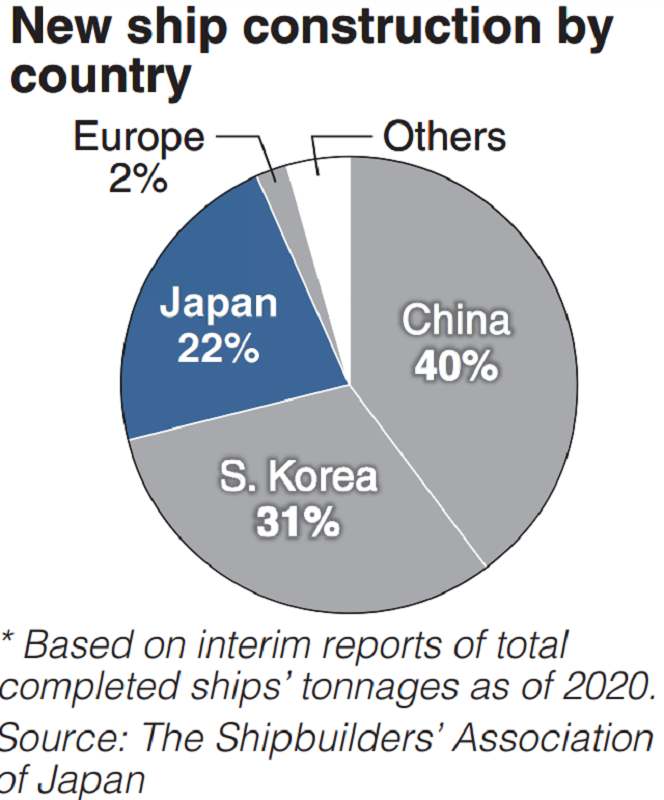
15:29 JST, May 17, 2021
A new international rating system on the fuel efficiency of oceangoing ships sailing beyond national borders will be established at Japan’s initiative, The Yomiuri Shimbun has learned.
A motion to revise a related treaty is likely to be adopted at an international conference in June, and the new system will be introduced in 2023.
According to research by the Land, Infrastructure, Transport and Tourism Ministry, Japan-built ships are expected to obtain higher ratings than those built in China and South Korea. Japan’s shipbuilding industry, which has an advantage in environmentally friendly technology, will likely get a boost from the new system.
The fuel efficiency rating system will cover large oceangoing ships such as container ships, petroleum tankers and cruise ships.
Once every year, the ships’ owners or operating companies will submit fuel efficiency data to the governments of the countries where the ships are registered, and one of five ratings from A to E will be issued. Fuel efficiency will be determined by calculating the volume of carbon dioxide emissions based on the ships’ sailing distances and weight and the volume of fuel consumed.
If a ship is rated E, or receives three consecutive D ratings, the owner will need to submit improvement plans to the government of the country where the ship is registered. In that case, the owner will be required to add equipment to improve fuel efficiency or cap the speed of the ship.
If improvements cannot be made, the ship will be banned from sailing.
Last year, the governments of 19 countries, including Japan, China, South Korea and Germany, jointly proposed a rating system for existing ships to a committee of the International Maritime Organization. The aim is to encourage the retirement of ships with low fuel efficiency and increase the number of environmentally friendly ships.
The proposal aims to raise the total fuel efficiency level of ships, compared with figures from 2008, by an average of 40% by 2030, and halve the volume of CO2 emissions by 2050.
Most ships use heavy oil as fuel, and CO2 emissions from international maritime traffic account for about 2% of the world total. Regulating ships that sail beyond national borders is difficult, so they have been exempted from the Paris Agreement, an international framework to cope with global warming.
Research conducted by the transport ministry in April indicates that ships built in Japan will obtain higher ratings than those from China and South Korea in many cases.
In a simulated rating of 8,175 ships built in Japan, China and South Korea under the proposed new system, more than half of the Japanese-built ships scored an A or B, which means their fuel efficiency levels are high.
The percentage of ships rated D or E, which will be restricted under the new system, was 17% for Japan, 33% for China and 36% for South Korea.
The fuel efficiency rating system is expected to create replacement demand for ships around the world.
Though ships built in China and South Korea now have inferior fuel efficiency levels compared with those built in Japan, those nations also support the new system, anticipating replacement demand.
With strong backing from their governments, Chinese and South Korean companies have a competitive price advantage in the global shipbuilding market and have increased their market share.
Japan’s market share of newly built ships in the 1980s was No. 1 in the world at about 50%, but that figure fell to 22% in 2020. Japan is currently third, after China with 40% and South Korea with 31%.
Top Articles in Business
-

Prudential Life Insurance Plans to Fully Compensate for Damages Caused by Fraudulent Actions Without Waiting for Third-Party Committee Review
-

Narita Airport, Startup in Japan Demonstrate Machine to Compress Clothes for Tourists to Prevent People from Abandoning Suitcases
-

Japan, U.S. Name 3 Inaugural Investment Projects; Reached Agreement After Considerable Difficulty
-

JR Tokai, Shizuoka Pref. Agree on Water Resources for Maglev Train Construction
-

Toyota Motor Group Firm to Sell Clean Energy Greenhouses for Strawberries
JN ACCESS RANKING
-

Japan PM Takaichi’s Cabinet Resigns en Masse
-

Japan Institute to Use Domestic Commercial Optical Lattice Clock to Set Japan Standard Time
-

Israeli Ambassador to Japan Speaks about Japan’s Role in the Reconstruction of Gaza
-

Man Infected with Measles Reportedly Dined at Restaurant in Tokyo Station
-

Videos Plagiarized, Reposted with False Subtitles Claiming ‘Ryukyu Belongs to China’; Anti-China False Information Also Posted in Japan




















